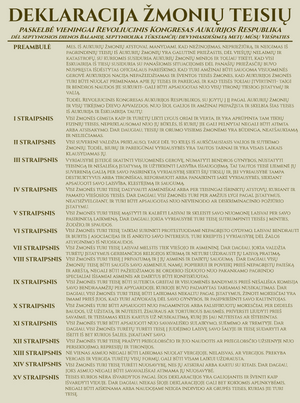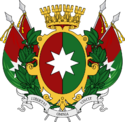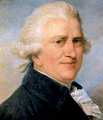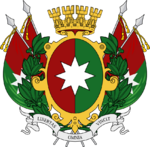Declaration of the Rights of the People
| Declaration of the Rights of the People | |
|---|---|
 An 1810 facsimilie of an engrossed copy. | |
| Created | March-April 1790 |
| Ratified | April 7, 1790 |
| Location | National Library of Aucuria |
| Author(s) | Klemensas Brazauskas Vykintas Čaplikas Silvestras Elinauskas Oskaras Fedaravičius Feliksas Ikalsevičius Aleksandras Kamaiška Ambraziejus Ozolinis Izoakas Poškus Kazimieras Treinys Goštautas Vacencas |
| Signatories | 127 members of the Aucurian Revolutionary Congress |
| Purpose | To proclaim human rights that the Revolutionary Congress intended to recognize and protect |
The Declaration of the Rights of the People (Aucurian: Deklaracija Žmonių Teisių) is a statement adopted by the Aucurian Revolutionary Congress, the interim legislature of the Aucurian Republic during the Aucurian Revolution, decreeing a list of several human rights that the Revolutionary Congress accused the Serene Kingdom of Aucuria of disregarding and that the republican revolutionaries intended to protect. The declaration was drafted by a committee of ten individuals appointed by the Revolutionary Congress's president, Bendiktas Klimantis, and was universally ratified by the 127 members of the body on April 7, 1790. Influenced by the doctrine of natural right, the Declaration holds that the rights of man are universal- valid at all times and places, pertaining to human nature itself. The Declaration justified the actions of the Sons of the Aucurian Nation by asserting certain natural rights, including a right of revolution.
The Declaration of the Rights of the People has become a well-known statement on human rights within Esquarium, inspiring legal documents in Katranjiev, Luziyca, Montecara, and Ultima Borealia; many Aucurians have also argued that the principles of the Declaration inspired republican actions in Ainin, Namor, Nevanmaa, Senria, and other countries that experienced republican uprisings or revolutions. Some anti-republicans in countries such as Tuthina have attempted to link the document to atrocities committed during the Great Republican Uprising, though many republicans have argued that such actions were themselves in violation of the document's principles. Within Aucuria, the Declaration composes one of the country's founding documents alongside the Constitution of Aucuria, and remains in effect as law.
Background
Rising discontent
Beginning of conflict
Drafting and ratification
Committee of Ten
After the Revolutionary Congress voted to issue a declaration listing the rights of the Aucurian people on March 26, the president of the body, Bendiktas Klimantis, appointed a committee of ten individuals to draft the document. Known formally as the Committee to Draft a Declaration of the Rights of the People (Aucurian: Komitetas Parengti Deklaracija Žmonių Teisių), the committee was widely called the Committee of Ten (Aucurian: Komitetas Dešimtukas).
| Committee to Draft a Declaration on the Rights of the People | |||||||||
| Klemensas Brazauskas | Vykintas Čaplikas | Silvestras Elinauskas | Oskaras Fedaravičius | Feliksas Ikalsevičius | |||||
|---|---|---|---|---|---|---|---|---|---|
| Aleksandras Kamaiška | Ambraziejus Ozolinis | Izoakas Poškus | Kazimieras Treinys | Goštautas Vacencas | |||||
Though composed mostly of lawyers and authors, Klimantis also chose members of the Revolutionary Congress from other professions for the Committee, believing that incorporating a variety of individuals would "both improve the quality of the declaration... and emphasize its universality". Perhaps most importantly given Aucuria's history of religious instability, the committee was composed of members of both major Aucurian Christian churches; Brazauskas, Čaplikas, Ikalsevičius, Ozolinis, and Vacencas were members of the Aucurian Church of Christ, whereas Elinauskas, Fedaravičius, Kamaiška, Poškus, and Treinys were Calvarists.
Because the committee left no minutes, there is uncertainty among historians about how the document was drafted; Brazauskas, Elinauskas, Ozolinis, Trienys, and Vacencas all wrote accounts at later dates, but these accounts contradict each other on several occasions. All five accounts agree that a rough draft of the preamble, written by Brazauskas and Treinys and submitted to the committee on March 28, was the first segment of the document to be written. It appears that all ten members of the committee proposed, wrote, and edited amendments; Elinauskas claimed in his memoirs that the declaration never had more than 18 articles during the drafting process, but Trienys claimed that it had- at one point- as many as 25 articles. It is generally agreed between the conflicting accounts, however, that several of the articles were segments of proposed articles or the combinations of proposed articles. Brazauskas's letters to his son Frīdrikas state that Articles I, II, III, and IV were one article when first proposed, and that Articles IV and V were similarly derived from one proposed article. Ozolinis told his wife Austėja that the committee had considered merging Articles VIII, IX, X, and XI, but decided against it. Both Fedaravičius and Vacencas claimed to have proposed Article VII to the committee.
Influences
One influence was the Edict of Religious Toleration, issued by Queen Jekatyrīna the Wise in 1631 following the Peasants' War, a major war between the followers of the Aucurian Church of Christ and the Calvarist Church. The edict allowed Aucurians to follow any branch of Christianity or Judaism, and was the inspiration for Article VII, which guaranteed freedom of religion for all Aucurians.
Adoption and signing
The finished declaration was first presented to the Aucurian Revolutionary Congress on April 1, 1790. The Revolutionary Congress altered the exact text of several areas of the articles and significantly shortened the preamble before unanimously ratifying and signing the document on April 7.
The first public distribution of the declaration did not occur until April 9.
Text
| Introduction |
THE DECLARATION OF THE RIGHTS OF THE PEOPLE
proclaimed unanimously by the Revolutionary Congress of the Aucurian Republic
on the 7th day of April, in the Seventeen thousand nintieth Year of Our Lord
|
| Preamble Outlines a general philosophy of natural rights and popular sovereignty and states the intentions of the Revolutionary Congress. |
We, the representatives of the people of Aucuria, believing that the ignorance, neglect, and denial of the basic rights of the people of Aucuria are the ultimate cause of the multitude of public calamities and catastrophes facing the Aucurian people, and further believing that all Esquarium is indeed facing similar situations for similar reasons, have resolved to set forth in a solemn declaration the unalienable and sacred rights of the people so that the public welfare of the Aucurian nation shall forever be protected, that the people of Aucuria shall be continually reminded of their rights and duties, and that the rights hereafter enshrined- and thus the common benefits they create- may be protected from all tyrants by just laws and popular will. Therefore, the Revolutionary Congress of the Aucurian Republic, with the powers vested in it by the people of Aucuria and with total faith in divine Providence, henceforth and forevermore recognizes and proclaims the following rights of the peoples of Aucuria and Esquarium: |
| Article I Declares human rights to be unalienable and universal. |
All people are born as and ought to remain equals in dignity and worth, and are endowed with certain natural rights, regardless of their condition, of which they cannot justly be deprived or denied. Furthermore, the rights and dignity of all people are inherent, irrevocable, and inviolable. |
| Article II Declares that government exists by the will of the people, and should serve the people. |
All sovereign power is vested in, and thus consequently derived from, the supreme will and consent of the people. Therefore, the offices and officers of government are the servants of the people and are at all times beholden to them. |
| Article III Declares that the people have the right to alter or replace a tyrannical regime. |
Government is instituted to promote the public welfare, provide for the common defense, establish just and equitable law, and ensure the preservation of liberty. It is the right of a people to vest their sovereign power in a government of their choice to work towards these ends and, should a government become destructive or tyrannical, to reform or abolish said government in order to protect their liberty, prosperity, and security. |
| Article IV Declares that the people have the right to participate in the creation of law and be equal under it. |
All people have the right to participate, personally or through justly elected representatives, in the creation and foundation of public law. Furthermore, all people shall forevermore be equal under the law without distinction, and should be protected from unequal or discriminatory treatment by the law. |
| Article V Declares freedom of speech and freedom of the press. |
All people have the right to think and speak freely, and to disseminate their opinions freely through the medium of their choice. Furthermore, no government has the right to abridge the rights to freedom of thought, of speech, and of the press. |
| Article VI Declares freedom of assembly and freedom of petition. |
All people have the right to peaceably assemble in protest of unjust treatment, to freely associate and form associations to advance their interests, and to petition the government for redress of grievances. |
| Article VII Declares freedom of religion. |
All people have the right to worship freely both in public and in private. Furthermore, no government should make laws respecting the establishment of a religion, nor shall they prohibit the free exercise thereof. |
| Article VIII Declares the right to privacy; stipulates a warrant should be needed for a person or their property to be searched or seized. |
All people have the right to privacy, and to the security of their person and possessions. Furthermore, the right of all people to be secure in their person, houses, papers, and effects against unreasonable searches and seizures shall not be violated without a warrant issued upon probable cause specifically detailing the persons or items to be seized. |
| Article IX Declares the right to trial by jury, presumption of innocence, and legal counsel. |
All people have the right to be given a speedy and public trial before an impartial jury of their peers within the district in which the alleged crime was committed. Furthermore, all people have the right to be presumed innocent by the law, to know the charges being levied against them, to have legal counsel for their defense, and to confront their accuser. |
| Article X Declares the right to protection from fabricated charges, excessive fines or bail, cruel and unusual punishment, torture, and double jeopardy. |
All people shall be protected from fabricated or falsified charges, excessive fines, bail, and sentencing, cruel or torturous punishment, being forced to testify against themselves, and being tried multiple times for an offense of which they have already convicted or acquitted. |
| Article XI Declares freedom of movement and the right to protection from arbitrary detention. |
All people shall be protected from arbitrary arrest, detention, or exile. Furthermore, all people should have the right to freedom of movement within their home country and the right to enter or exit any country, including their own. |
| Article XII Declares the right to seek asylum. |
All people shall have the right to seek and enjoy asylum or refuge abroad from persecution, repression, and tyranny. |
| Article XIII Condemns slavery and the slave trade. |
No person shall be held permanently in slavery, servitude, or bondage. The slave trade and slavery should, in all their forms, be forever prohibited. |
| Article XIV Declares the right to own property. |
All people shall have the right to own property as their own or in association with others. Furthermore, no individual shall be arbitrarily deprived of their property. |
| Article XV Declares rights not listed to be as valid as those listed and states that the declaration may not be used to deny the rights of a person or group. |
Rights not enumerated within this declaration are as valid and as sacred as those enumerated within. Furthermore, nothing in this declaration may, under any circumstance, be construed or used to deny an individual or group the rights to which they are entitled. |
| Signatures All 127 members of the Aucurian Revolutionary Congress signed the Declaration of the Rights of the People. |
4
The unnamed parameter 2= is no longer supported. Please see the documentation for {{columns-list}}.
|
Publication and reaction
The engrossed copy and first printed versions of the declaration were made by publisher Jonas Voketaitis and first distributed on April 9, 1790 to the inhabitants of the city of Laižuotas. Copies were also sent to printing presses across republican-controlled areas and to republican armies, to be read to the soldiers by their commanding officers. Juozapas Kairys, commander of the Republican Army, read the declaration to his army on the eve of the Battle of location, which would turn out to be a major victory for the republicans and a humiliating defeat for the royalists.
Possession and publication of the document was forbidden in royalist-controlled territories, but was smuggled into these areas in spite of attempts by the monarchy to prevent this. On May 3, 1790, several dozen copies of the declaration were posted by an unknown individual or group at night in Kalnaspilis.
Legacy
Domestic legacy
Within Aucuria, the declaration inspired many revolutionaries in the region of Atlia. The perceived failure of the Aucurian government to respect the rights of Atlians living within the Atlian Territory. The facts that the Aucurian government appointed individuals to govern Atlia instead of letting the Atlians elect them, silenced calls for independence from Atlians and jailed Atlian separatists, and interfered with the operations of mosques and madrasas were cited by Nasrilâh Kartal and other leaders of the Atlian National Movement as acts of tyranny- and hypocrisy- by the Aucurian government in the run-up to the Atlian Rebellion.
The declaration was later used to attack the authoritarian government that controlled Aucuria between 1872 and 1952 during both the Worker's Revolution and the Velvet Revolution.
Legal status
The Declaration of the Rights of the People is legally still in effect in Aucuria.
Legacy abroad
The Declaration of the Rights of the People was one of the first such declarations to be printed in Esquarium, and is generally considered to have ultimately inspired republicans and later declarations of human rights in various other Esquarian countries. (pls other countries with republican governments or rebel movements add yourselves)
 Katranjiev
Katranjiev
The mention of the "the growing wisdom of the people has given them access to new political ideas from distant lands that may pose a threat to the stability of Katranjiev should we not grant them their requests;" mentioned in the preamble of the Constitution of Katranjiev is a clear reference to the Declaration of Rights of the People, since republican rebels led by Igor Sprskov in the 1860s explicitly used the Declaration to justify their rebellion against the King, as well as republican elements in Planinkhora.
In addition, the entire second chapter of the Constitution is greatly influenced by the principles of the Declaration of the Rights of the People.
 Luziyca
Luziyca
In Luziyca, this document was claimed to have inspired the provisions of the Constitution of Luziyca, especially for their Charter of Rights and Freedoms.
 Montecara
Montecara
The Declaration inspired the Montecaran Declaration of the Rights of the Citizen of 1870, adopted in the wake of the Liberal Revolution by the new radical government.
 Namor
Namor
Adherents of the syncretic religion Kansism consider the members of the Committee of Ten to be saints and manifestations of the supreme being Songte, due to their role in the introduction of human rights.
Template:Country data Saheil
While Saheil does not have a seperate and sacred declaration of rights, the Declaration of Rights of the People served as a major insiperation for Title III of the Constitution of Saheil, called the Declaration of Rights and Responsibilities, which enumerates the natural and sacred rights of the Saheilian people.
 Senria
Senria
On April 7, 1918, the Senrian Republican Party under Ryuunosuke Miyamoto launched a series of nationwide protests and strikes aimed at forcing the imperial government of Senria to create a constitutional monarchy with an elected legislature and executive. The date was chosen by Miyamoto and other Republican leaders because it was the 128th anniversary of the ratification of the Declaration. A violent response to these protests ultimately led to the Senrian Revolution and the creation of a republican government in Senria.
 Tuthina
Tuthina
During the Great Republican Uprising, the Declaration of the Rights of the People was commonly cited by republican rebels as one of their chief inspirations for the revolution. In particular, the Supreme National Assembly for People's Purity that controlled southern Daran region frequently referenced the Declaration for its action, including its "national purification" policy that aimed for establishing various homogeneous national republics in Tuthina. Commonly called the Elegy of Blood, the policy was said to be responsible for systematic killing of millions of individuals under its reign.
Despite many Aucurian scholars arguing that the actions of the Purity Assembly "strayed from true republicanism" and were in contravention of the principles of the Declaration, atrocities committed by the Purity Assembly continued to be attributed to republicanism, spearheaded by the Declaration, within Tuthina. A large stele with the Declaration engraved in Literary Tuthinan by the Assembly during its reign continue to be erected in Mnka' alongside mass graves created by Elegy of Blood to this day, and is a common destination for tourists and nearby school trips.
Template:Country data Ultima Borealia
In Ultima Borealia, the document inspired the 1795 codification and reform of the Constitution of Ultima Borealia, which itself added a Declaration of the Rights of Borealians inspired by the Declaration of the Rights of the People, with this Declaration largely kept intact in the 1879 Constitution, although this Declaration was completely modified and altered in the 1925 Constitution (the current Borealian Constitution), which is a socialist document that added second-generation and in the 1980s third-generation rights.
 Xiaodong
Xiaodong
The Declaration of the Rights of the People has been a key document in the formulation of Xiaodongese liberal thought. Variations of the Declaration were first used during the 1905 Constitutional Revolution, although the revolution ultimately resulted in little of the declarations aims to be adopted. It was also used in the Orchid Revolution but similarly no bill of rights was adopted to protect Xiaodongese rights.











